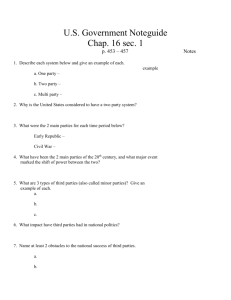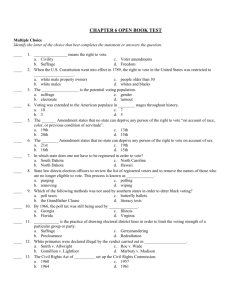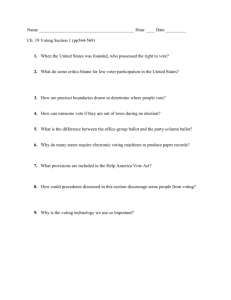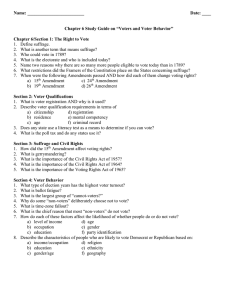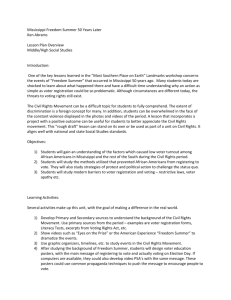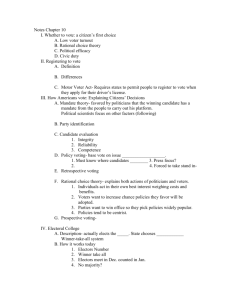THE POLITICS OF VOTING
advertisement
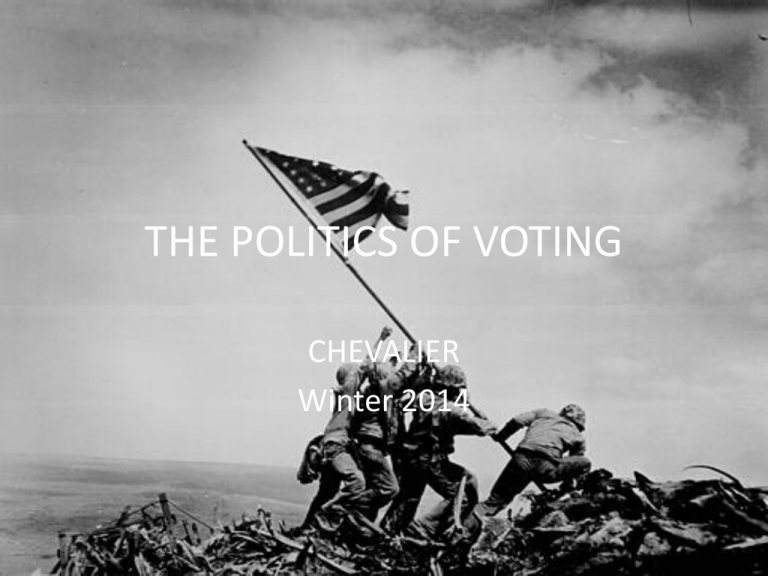
THE POLITICS OF VOTING CHEVALIER Winter 2014 THE RIGHT TO VOTE • SUFFRAGE OR FRANCHISE IS A SYNONYM FOR VOTING AND VOTING RIGHTS • The electorate in the USA is approximately 216,150,000 • This leaves 30% of Americans who can’t vote 5 STAGES OF EXTENDING SUFFRAGE • 1. early 1800’s- land requirements were abandoned, religious requirement abolished, by the mid 1800’s all WHITE men could vote • 2. 15th amendment in 1870 gave all men the ability to vote regardless of color 5 Stages of Extending Suffrage • 3. 19th amendment- gave all people (of voting age) right to vote regardless of sex • 4. 24th amendments ended poll taxes • 5. 26th amendment gave 18 year olds the right vote (1971) QUALIFICATIONS TO VOTE • 1. CITIZENSHIP • 2. RESIDENCE • 3. REGISTRATION • 4. AGE VOTER BEHAVIOR- WHY PEOPLE DON’T VOTE • • • • • • • • “IDIOT” Voter apathy, ballot fatigue, and time zone fallout Illegal aliens Handicapped (6 million) Traveling Mentally ill (500,000) Jail/religion Political efficacy- believing in influence VOTER BEHAVIOR- WHY DO WE VOTE THE WAY WE DO? • Political Socialization- the process by which people gain their political attitudes and opinions. • So, what affects it: Voter Behavior • A voter’s personal characteristics: – Age – Race – Income – Occupation – Gender – Education – religion HOW DIFFERENT GROUPS TEND TO VOTE • • • • • • Catholics and Jews- democratic Protestants- republican African Americans- democratic Latinos- democratic Cuban Americans- republican Mexican Americans- democratic OTHER FACTORS • Geographical factors • Psychological factors (perception of politics to each voter) – Party identification – Straight-ticket voting – Split-ticket voting – independents THE SPECTRUM OF POLITICAL IDEOLOGIES IN AMERICA • Pure liberals (left) • Populists- Constitutional governance, liberty, anti-militarism, bill of rights, de-centralization of power • Libertarians- free-market economy, civil liberties and personal freedom, nonintervention, peace, and free trade • Pure Conservatives (right)
